The search engine results page (SERP) is shown to users when they conduct a search on search engines like Google.
The user types in their search query (also known as keywords) in the search bar.
Based on the search query, the search engine returns a SERP that contains a list of the top 10 organic search results.
The SERP also contains other SERP features such as paid listings, featured snippets, video results, related searches, and People also ask boxes.
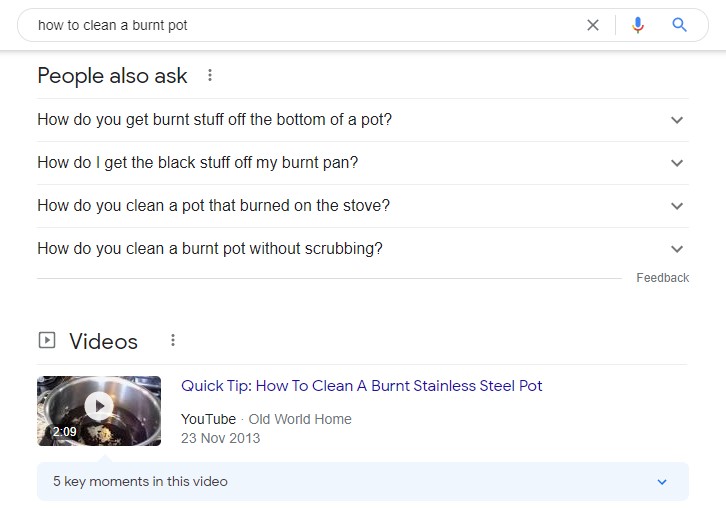
SERP tracking of organic search results is crucial to monitoring the performance of your SEO campaign.
In this article, I will discuss the importance of tracking SERPs and also share the best ways to track your competitors' SERP rankings, as well as your own.
Let’s begin!
Why is it Important to Track SERPs?
Webmasters or marketers should not ignore the importance of tracking SERPs.
Monitoring SERPs is crucial as it allows you to check how your website is performing in the search results. In addition, it also tells the search performance of your competitors.
By tracking SERPs, you can build a successful SEO strategy that helps you gain higher rankings in the search engines.
Here are several reasons why it is essential to track SERP performance.
Helps You Track Competitor SERP Rankings
One of the most significant advantages of SERP tracking is that it allows you to analyze your competitor's performance. You can analyze how they are optimizing their title tags, meta description, and URL to rank higher on SERP. Here is an example:
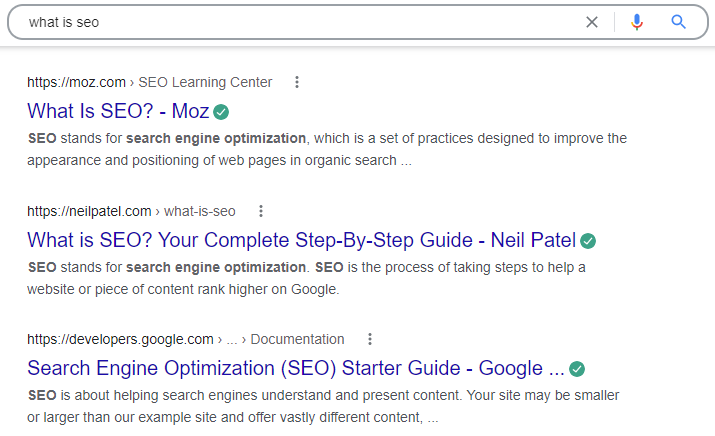
As you can see in the above image, these websites use some strategies to compete with each other. For example, they are adding the target keyword in the title, description, and URL. Also, some sites are using the data to show the content freshness to users and search engines.
Monitoring your competitors' search performance can help you:
- Identify new strategies your competitors might be using.
- Discover new SERP competitors.
- Catch algorithm updates early.
Lets You Monitor Your Website's Organic Rankings
Monitoring organic search rankings is essential for every webmaster to analyze the overall performance of their website in the search results.
It also allows webmasters to see the performance of targeted keywords on the SERP.
If you don't see your website on the first page of Google, then you have to analyze why other sites are ranking for your targeted keyword.
You can open every result and dig deeper to discover what they are doing special that you are not doing.
Maybe they have longer content as compared to you, or they have more backlinks pointing to their site, or they are using LSI keywords in the content.
Moreover, tracking SERP is also vital because sometimes your site starts to rank for popular keywords on the second or third page of Google, and you don't even realize your business is ranking so high.
In the world of SEO, we refer to these opportunities as low-hanging fruits. When you track SERPs, you immediately discover these low-hanging fruit keywords, which you can further optimize to gain the first page rankings easily.
Quickly Identify and Fix Reasons for Drops in Traffic
Search engine algorithms are regularly updated with new changes in order to offer customers better and more relevant results.
If you don't monitor your search rankings, you might not know if there is a drop in your organic traffic.
When you discover that your rankings have dropped, you should start by reviewing your keyword rankings. This allows you to find the exact keywords and site pages that have had significant declines in recent times.
![]()
Once you have discovered the keywords with a significant decline in the SERPs, it's important to investigate the reasons behind the drop.
The most significant cause of a drop in organic traffic is an algorithmic update which you can easily fix after studying the update and making changes to your SEO strategy accordingly.
Other reasons for the drop in traffic can be:
- Lost or broken links
- Outdated content
- Incorrect robots.txt updation
- Site migration
Identify if Your SEO Efforts are Paying Off
If you are investing in SEO, you definitely want to know whether your SEO efforts are paying off.
The best way to measure the SEO campaign performance is to track the performance of your target organic keywords.
If the keywords continue to improve their organic position, then your SEO tactics are working. If there are no improvements at all even after six months of SEO work or if your keywords continue to decline further, then you need to revamp your SEO strategy.
Therefore, the importance of tracking SERPs can’t be overlooked. It is one of the best ways to identify the performance of your SEO team.
How to Track SERPs?
Now that you have understood the significance of tracking SERPs, let’s move on to find out the best ways to track SERPs.
Here are the top ways to track SERPs.
Utilize a Keyword Tracking Tool
Keyword tracking tools such as SEOptimer are excellent for tracking SERPs.
You can instantly see how your website and competitors' websites rank in the organic search in different target locations around the world.
In addition, you can also find out the estimated traffic received from the keywords along with other crucial metrics such as total search volume, ranking URL, ranking positions, and also the competition on these keywords.
![]()
There are two methods for tracking keywords using SEOptimer:
- Search by keywords: You can check organic rankings by entering multiple keywords at a time.
- Search by domain: Enter the website URL, and the tool retrieves all the keywords on which the site ranks.
You can also check keyword rankings at particular locations.
Login to SEOptimer and open the keyword tool.
Now, select your target location.
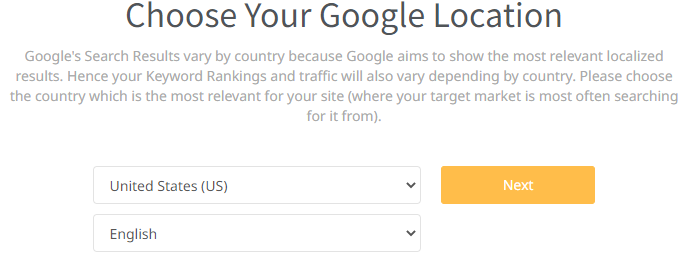
Thereafter, enter your keywords.
Now when you click on keyword rankings on your dashboard, you can see the position of the keywords along with estimated traffic.
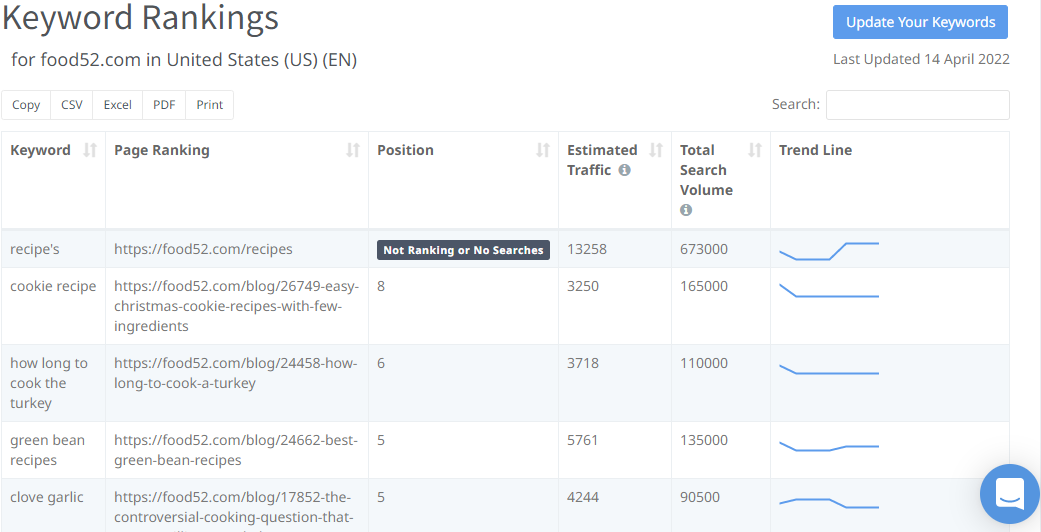
Apart from the keyword tool, SEOptimer also offers a free SEO audit and reporting tool that lets you conduct a free website analysis. You can find an actionable list of recommendations to boost the overall SEO score of your website.
With SEOptimer, you can track up to 250 keyword rankings per month. You can start using SEOptimer to conveniently track your keyword rankings. The tool is perfect for startups, freelancers, and SEO agencies.
Track SERPs Manually
Another method of tracking SERP is manual tracking.
In this method, you don't use any keyword tracking tools, but you use search engines like Google and Bing to perform manual SERP tracking.
To track SERP manually, open your browser and go to any search engine where you want to track your keywords ranking.
Let's say you want to track SERP on Google, open Google search, and type your keyword in the search bar.
For example, we wish to track SEOptimer's ranking for the keyword 'free SEO audit online.'
After searching the keyword, you will see the first page of Google SERP that contains the top 10 organic search results.
For every result, you can see their meta title, description, and page URL. In our case, SEOptimer is ranking at the top.

If your website is not ranking on the first page of Google, then you can continue your search to the second or third page.
Another easy way to conduct a manual search is to change the search settings to 100 per page.
To enable Google to display 100 searches per page, click on the gear icon in the top right of the browser and click “See all settings.”
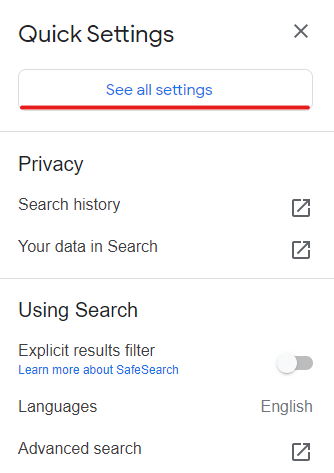
Now, scroll down the results per page slide bar to 100.
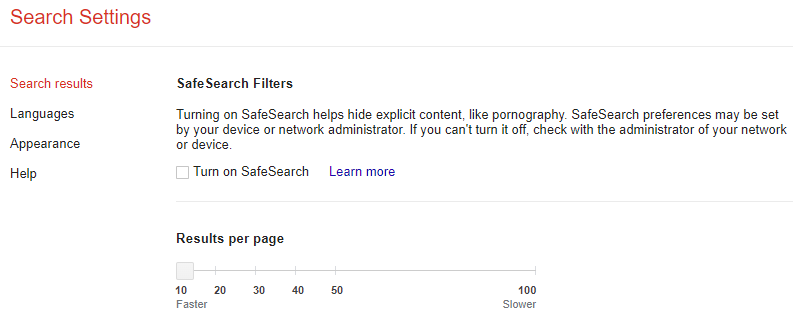
This will make Google show 100 results in one SERP instead of the default 10.
Now, you can enter your target keyword in the search bar and press CTRL+F.
Thereafter, enter your website URL in the top right search bar that is seen as soon as you press CTRL+F and press enter.
If your website is present in the top 100 search results, it will get highlighted.
Similarly, you can track the SERP of several different keywords in any search engine of your choice.
Which Keywords Should You Track?
Keywords play a vital role in SEO success.
Identifying the right keyword to target can make or break your SEO strategy.
Here are the types of keywords that you should track in your SEO campaign to accurately measure the impact of your SEO strategy.
Keywords That Are Already Generating Traffic
As a first step, you should identify the keywords that are already generating traffic to your site.
These low hanging-fruit keywords are easy to optimize, and they can quickly improve the organic traffic to your site.
You can use Search Console to track keywords on which your website is already ranking in Google.
First, go to Search Console and open your website or property, as shown in the image below.
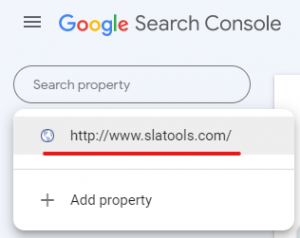
Now, go to Performance > Search Results
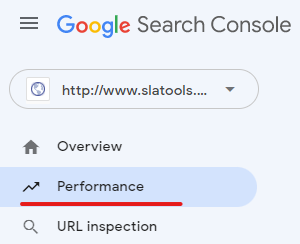
In the search result option, you can see performance metrics like the total number of clicks, impression, average CTR, and average position.
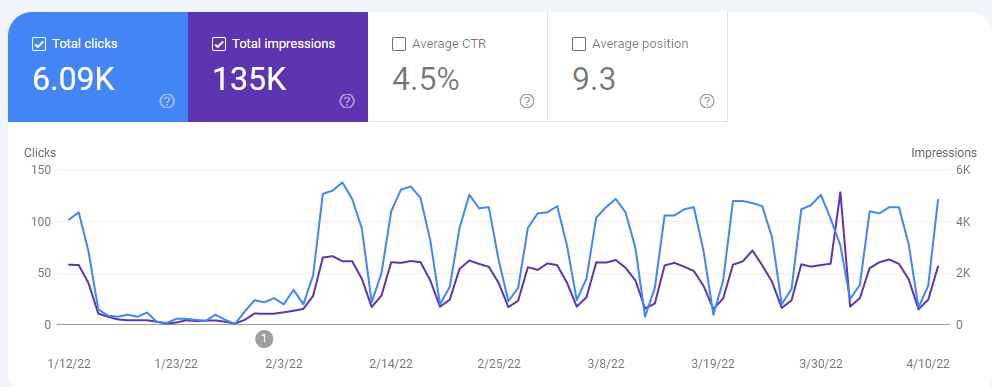
Scroll down the page and you will see “Queries” as shown in the image below.
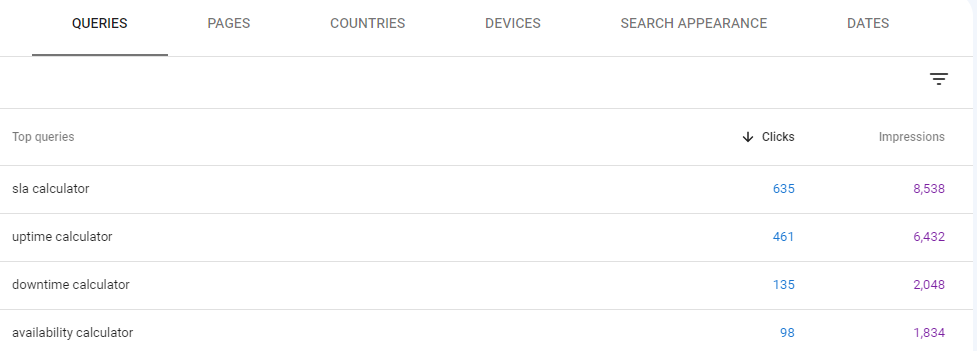
These are all the low-hanging fruit keywords that are ranking on Google and generating clicks and impressions for your site.
Here clicks and impressions mean:
- Clicks: Number of times users click on your website search result on Google.
- Impressions: Number of times your website appears on Google.
Note down the keywords that are generating the maximum clicks because these are the ones that are ranking higher on Google.
Also, pay special attention to keywords that are generating tons of impressions but little to no clicks. These are the keywords that you need to optimize to boost your SEO campaign.
Using Search Console, you can find untapped keywords opportunities to boost your search engine rankings.
Optimizing your website for keywords where your site is already in the top 10 and keywords where your site is ranking in the top 100 can massively help to improve your SEO game.
Keywords That Lead to the Most Conversions
High-converting keywords are those that lead to sales.
Tracking such keywords can be very helpful for your business as it will enable you to know the products and services that are leading to conversions.
Once you identify the high-converting keywords for your business, you can primarily focus your SEO strategy on those products or services that are impacting your bottom line.
To find the top converting keywords, you can use Google Analytics.
Open your Google Analytics account and go to Acquisition > Overview.
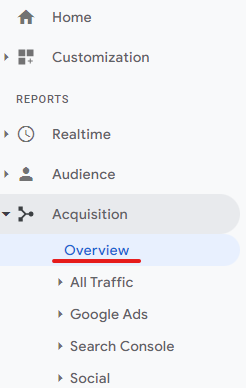
You will see a screen similar to the below image. Click on Organic Search.
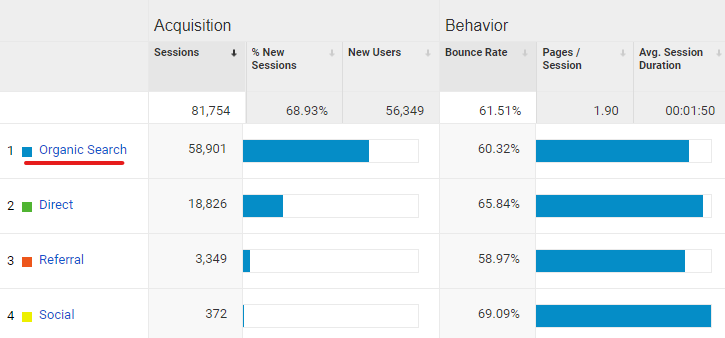
Here, you can check the number of conversions for every keyword.
Note down the keywords that are leading to maximum goal completions.
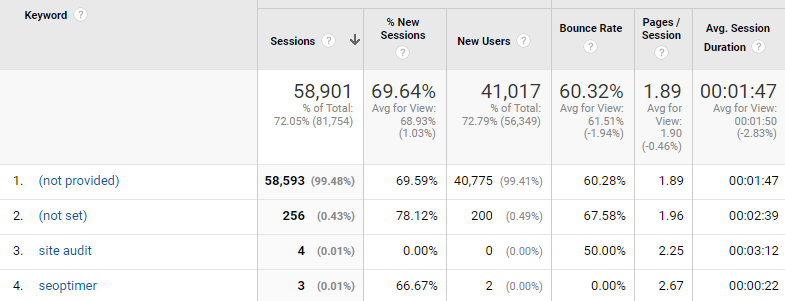
Therefore, tracking high-converting keywords tells you the keywords and target pages that are assisting in goal conversions.
Tracking the SERPs of such high-value keywords is crucial because even a slight decline in rankings can lead to a significant loss in revenue.
Branded Keywords
Branded keywords are keywords that are closely related to your brand, products, and services.
Searching for branded keywords might help you identify paid ads that your competitors are running on Google or Bing. These could include phrases like:
- [brand name] Alternatives
- [brand name] competitors
Users who search for your brand keywords are more likely to buy from your brand. So, it's a good practice to track branded keywords.
Conclusion
Rank tracking is an essential part of the SEO workflow. You can use rank tracking to get in-depth information about how well your website is performing on search engines.
SERP tracking allows you to analyze your competition and how they perform on search results. You can see the pages and keywords that drive the maximum traffic to your competitor's sites.




